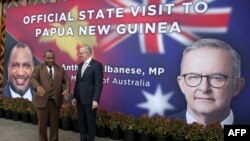Australian Prime Minister Anthony Albanese is preparing to sign a new security deal with his counterpart in Papua New Guinea as Canberra looks to counter Chinese influence in the Pacific. Albanese arrived in Port Moresby on Thursday aiming to deepen defense ties with Australia’s nearest neighbor.
Regional security is expected to dominate talks between Australian Prime Minister Anthony Albanese and Papua New Guinea Prime Minister James Marape.
The leaders are discussing a formal Bilateral Security Treaty that is expected to be ratified by June. Details of the accord have yet to be made public.
Just a few kilometers of sea separate the countries. This is the first visit to Papua New Guinea by an Australian prime minister since 2018. Albanese will be the first foreign leader to address the country's parliament.
Analysts say his visit is part of Canberra’s efforts to counter China’s diplomatic and trade ambitions in the Pacific.
Australia is pursuing what officials call a “family-first approach” to security in the region – a strategy based on close bonds regional countries have that experts believe deliberately exclude China.
Last year China signed a security agreement with the Solomon Islands, a close neighbor of Papua New Guinea. The archipelago is about 2,000 kilometers northeast of Australia, with a population of 700,000. At the time, Solomons leader Manasseh Sogavare said the pact with China would offer protection from “external or internal threats” and was no different than a security agreement already in place with Australia. Beijing, however, failed to convince other Pacific countries to join a broader regional pact.
Pat Conroy, Australia’s minister for international development and the Pacific, told the Australian Broadcasting Corp. Thursday that Albanese’ visit to Papua New Guinea will deal with environmental and security issues.
“It is also about joint efforts to combat things like climate change and about strengthening the Pacific regional architecture with a Pacific family first approach to security needs throughout the Pacific. So, it is all about strengthening Australia’s and PNG’s relationship and making it clear that we are the security partner of choice,” said Conroy.
Australia’s foreign affairs minister, Penny Wong, has made several visits to Pacific countries since Albanese’ Labor party won a federal election last May.
Last month, Wong signed a new security accord with Vanuatu.
While attempting to counter China’s ambitions in a region it regards as its traditional sphere of influence, Australia is also attempting to soothe relations with China, its most important trading partner.
Geopolitical and trade disputes have damaged the bilateral relations to such a degree that in recent years both sides have barely been on speaking terms, but there’s now an apparent thaw in relations.
Albanese met Chinese President Xi Jinping on the sidelines of the G-20 summit in Bali, Indonesia last year.
Canberra and Beijing have conceded that there will inevitably be disagreements between them but both sides have indicated they are seeking stable, honest dialogue and an end to diplomatic hostilities.








